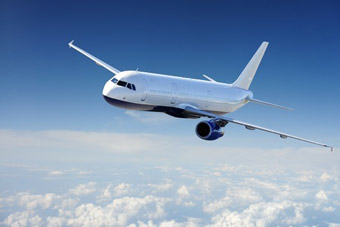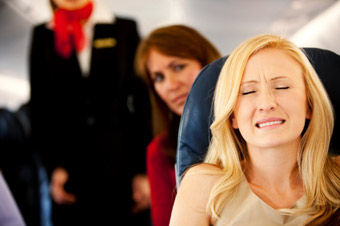Fear of Flying – How to Cope
For many travellers, jetting off on a plane to another city, country or continent is an exciting prospect, but there are plenty of other travellers who don’t have the same enthusiasm for flying. In fact, they have an active fear of just getting on that plane. While some do their best to avoid air travel altogether, opting for trains, buses and boats, this isn't always an option.
In fact, they have an active fear of just getting on that plane. While some do their best to avoid air travel altogether, opting for trains, buses and boats, this isn't always an option.
Those who want to embark on a trip of a lifetime to the other side of the world, visit family abroad, relocate to another country or have to travel for work, simply can't afford not to fly, if they want to achieve their work or life goals.
However, despite air travel being a necessity for many and the quickest form of travel to many destinations, it doesn't mean you have to like it. Just the thought of going on a plane can bring on severe anxiety and discomfort for individuals, let alone actually getting on an aeroplane and taking off.
To help you understand and cope with the fear of flying, at UK Airport Car Parks, we’ve put together a guide on travelling when scared and tips and advice on how to manage anxiety to make travelling a more pleasant and relaxing process.
Fear of Flying – What is it and what are the causes?
Understanding the fundamentals of a fear of flying, which affects millions of people around the world, can go some way to helping you deal with the problem. Fear of flying is the fear of being on an aeroplane while it is in flight. It often includes dreading the flight before you are even on the plane.
It’s one of the most talked about phobias due to the increased popularity of air travel throughout the world. It’s also known as flying phobia, flight phobia, aviophobia or aerophobia. One of the most common causes of a fear of flying relates to anxiety that the plane is going to crash for any variety of reasons and that it will result in death.
The other is that you might have some horrible physical experience, perhaps feeling you'll faint, have a heart attack, or become hysterical, and lose control of yourself in some way, and be totally embarrassed.
It doesn't matter how many statistics you've read that you're more likely to be run over by a bus than be involved in an aeroplane crash, for many it is still a real possibility that plays on one part of your brain. Even though you know the chances are one in however many, like winning the lottery, it really feels that "it could be you!"
 Fear of flying is a phobia within itself, but there are numerous factors that can also contribute to a fear of flying that make it such an interesting and complex phobia.
Fear of flying is a phobia within itself, but there are numerous factors that can also contribute to a fear of flying that make it such an interesting and complex phobia.
Those who suffer from claustrophobia, the fear of being confined, restricted and unable to escape, often find this is the main contributing element to their fear of flying.
Likewise people suffering from agoraphobia, the fear of having a panic attack somewhere far away from help, are scared of losing control of themselves. Acrophobia, fear of heights, becomes part of the fear of a loss of external control - the plane crashing and there being nothing you can do about it.
Likewise the fear of terrorism or hijacking on the plane is part of this fear of a loss of external control - you cannot control what will happen to the plane. After the events of 9/11 in New York this has become a major factor for many already anxious travelers, as well as those who were previously cool, calm and collected during flights.
So the central problem for those with a fear of flying is the fear of not being in control. Not knowing how an aeroplane works, not being in control of it or the situations that could arise during flight is what bothers one group who fear flying, and not being in control of what might happen to their own body and mind is what worries the other group.
In each case, individuals experience different symptoms and triggers that set off the feelings of anxiety, uneasiness and panic that relate to the fear of flying.
Help is at Hand
Thankfully, with such a common and recognised phobia, there is increasing help at hand to enable those anxious travelers to manage their phobia and to give peace of mind during air travel.
While some opt for a few ‘Dutch courage' drinks before the flight (not recommended) or prescribed medication to numb the feelings of anxiety, there are plenty of other effective ways to tackle the problem head on, rather than try and bury it.
Knowledge is Key
For many who suffer from a fear of flying, some of the feelings relate to not knowing how a plane operates. However this isn't the whole story. Many of us don't know how other forms of transport - car, train or boat- work, but are not afraid nonetheless.
A basic understanding of how planes fly can be helpful for some anxious passengers, but this is best done as part of a wider process of dealing with the "what if" fears. So you learn how to argue with the things that could go wrong, using the factual information regarding how planes fly, and then let your mind move on from that. This work can help to quell some of the more irrational fears.
For example, if you constantly suspect the worst when the seatbelt signs go on or you hear the landing gear go down or up, then learning more about the reasons why these things happen and the mechanical procedures for what happens in flights can go some way to put your mind at ease.
This can be done by educating yourself online, or even learning to fly yourself. However if your fear is a loss of control of the plane, do remember that you won't be in the cockpit of your holiday jet - even pilots must become passengers when they're not at work, and give up the control to others!
Fear of Flying Courses
 Another great way to educate yourself on air travel is to attend a fear of flying course. These are provided by more and more airlines and airports throughout the UK than ever before and have had great success in helping nervous flyers to overcome their fears.
Another great way to educate yourself on air travel is to attend a fear of flying course. These are provided by more and more airlines and airports throughout the UK than ever before and have had great success in helping nervous flyers to overcome their fears.
Some of the main airports in the UK offering these courses include:
Gatwick Airport – Courses from Fly and Be Calm, Virgin Atlantic, British Airways and EasyJet
Heathrow Airport – Courses from British Airways and Virgin Atlantic
Manchester Airport –Courses from Fly and Be Calm, Virgin Atlantic, British Airways and EasyJet
Stansted Airport – Courses from Fly and Be Calm and EasyJet
Glasgow Airport – Courses from British Airways, Virgin Atlantic and EasyJet
Specialist Psychologists offering help for individuals as well as small groups include "Freedom to Fly", run by Elaine Iljon Foreman, and Professor Robert Bor.
Alternative Treatments
However, knowledge isn’t enough to help everyone, as knowledge often only appeals to the rational side of the brain, not the irrational side that often fuels the fear. This is where hypnotherapy and other types of behavioural therapies can be a good solution and have often been proven to help.
Hypnotherapy
We think that hypnotherapy deserves a special mention because of its excellent past record in combatting this somewhat irrational fear. The fact that statistically flying is the safest mode of transport is usually no comfort to anybody with a fear of flying. It's generally the sufferers hightened fear of disaster that creates the problem... hence the often heard quote from sufferers "I'm not afraid of flying, it's crashing I'm afraid of!".
A trained hypnotherapist has many tools to help combat this fear and to control the subconsious part of your mind which is probably working overtime. They can also help with one of the main causes of this fear, and that is the feeling of not being in control.
A trained hypnotherapist has many tools to help combat this fear. It is worth being aware that even for people who do not go into a deep hypnotic trance, it is still possible to achieve major changes in their fear.
If one type of treatment does not help you, do not despair. It can well be worthwhile trying another, as different people do respond to different therapies.
So whether your fear of flying is deep routed and has stopped you enjoying travel for many years or whether you're more of a nervous flyer we would highly recommed taking a few sessions with a hypnotherapist.
These therapies work to identify the cause of these irrational fears, unlocking their source and desensitising the brain to these events and emotions related to a fear of flying.
Medicated Treatments
Another drug based solution, besides the poor choice of the ‘Dutch Courage' approach of drinking alcohol before flying, can lie with chemical treatments in the form of anti-anxiety drugs like benzodiazepines, drugs that control the speed of your heart like beta-blockers, or other relaxant or anti-depressant drugs.These prescribed drugs can take the edge off the fear, decreasing the anxiety experienced.
However, each individual can react differently to these treatments. In some cases it can actually cause the anxious flyer to have a distorted view of reality, and to feeling somewhat "out of control". It is also not recommended to travel under the influence of drugs for any length of time, so long-haul travel can be problematic.  Read our recent blog post about a product called Xtresia which is suppose to be very helpful when flying. It has received many good reviews from many travellers.
Read our recent blog post about a product called Xtresia which is suppose to be very helpful when flying. It has received many good reviews from many travellers.
Other Tips for Fear of Flying
If you aren’t convinced by hypnotherapy, medication or fear of flying courses, or perhaps you feel your phobia isn’t so extreme as to warrant these treatments, there are plenty of other tips and hints that can make flying a more pleasant and relaxing experience.
A Little Light Reading
Two relatively new books, one by Professor Robert Bor, Dr Carina Eriksen and Margaret Oakes, 'Overcome Your Fear of Flying", and one by Elaine Iljon Foreman and Dr Lucas Van Gerwen "Fly Away Fear" give information on how planes fly, as well as focusing on the thoughts and emotions that people feel when they’re anxious about flying. They provide coping techniques that re-focus the irrational side of the brain to be more positive and as a result, rational.
Focus on the Positives
A great way to get you through the idea and reality of a flight is to focus on the positive reasons for travelling. Perhaps you’re off to visit friends abroad or you’re embarking on your honeymoon – these are all positive attributes to focus on. Furthermore, think about your destination, what you’ll do there, people you’ll see and so on. Even for those travelling on business, this can spur positive and rational thoughts.
Distraction and Relaxation Techniques
For those who are anxious flyers, there is nothing better than a distraction to carry you through the negative thoughts during take-off and landing, as well as bumpy turbulence (which is only a change in air currents – it happens all the time and is unlikely to cause any damage to the plane, even during the roughest bouts). A good distraction can be providing yourself with plenty of in-flight entertainment with books, tablets, games and films. But if these aren’t working, look outside of your bubble for distraction, such as starting a conversation with a fellow passenger.
A good distraction can be providing yourself with plenty of in-flight entertainment with books, tablets, games and films. But if these aren’t working, look outside of your bubble for distraction, such as starting a conversation with a fellow passenger.
Breathing exercises can also work well to calm nerves and focus the mind too. If you start to feel anxious, feel like you have sweaty palms and such, set your line of vision on the back of the seat in front, then breathe in deeply for five seconds and out for the same. Do this for several minutes and your heart rate will significantly drop and you’ll feel much calmer.
Other ways to calm your nerves about strange noises or turbulence is to speak to the cabin crew. They're well versed in air travel (of course!), are trained to support those with a fear of flying and will be able to reassure you that these noises are perfectly normal.
Keep Hydrated
When you're flying it's important to keep your blood sugars up and keep well hydrated. Before, during and after flights, drink plenty of water or natural juices and avoid alcohol, while eating little and often.
Make Reservations
Another element that relates to the fear of flying is the feeling that you're not in control. However, there are certain aspects of flying and your own comfort that you can control, so get prepared before you fly and reserve your seating.
For anxious flyers, an aisle seat over the wing or near an emergency exit is a good choice, as the wing seats tend to experience less in-flight turbulence and you'll feel less trapped closest to the aisle and emergency escape route.
There is no quick way to overcome a fear of flying, but putting some of these coping techniques into practice on your next flight or even seeing a Specialist, or embarking on a fear of flying course can make all the difference.
It’s also important to remember that you’re not alone in your fear, there are millions of sufferers out there, so letting those you’re travelling with know, including airport and cabin crew, can help to reassure and calm you during those anxious moments.
You may want to read our blog post on Fear of Flying. Good Luck from UKACP.
Good Luck from UKACP.




